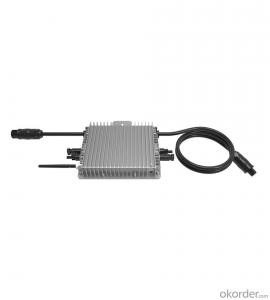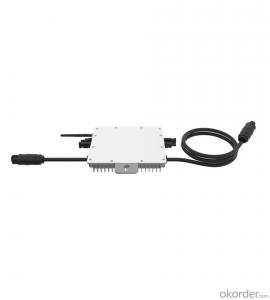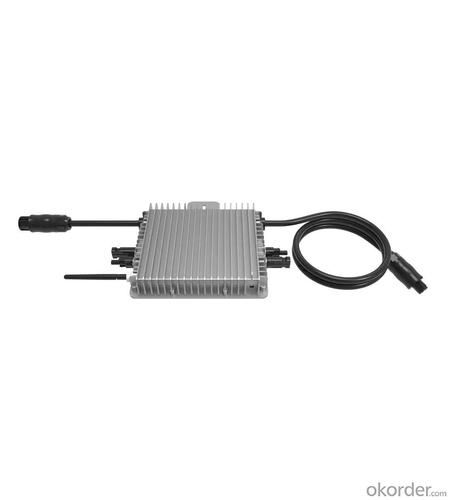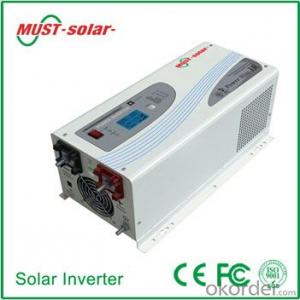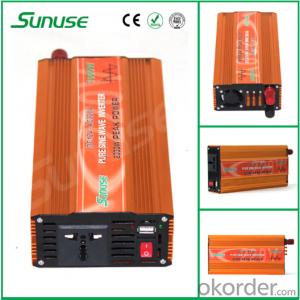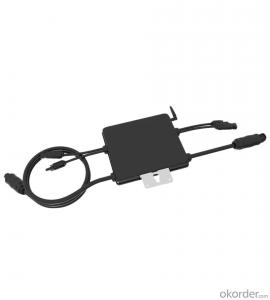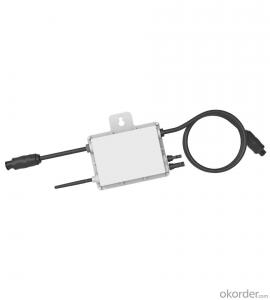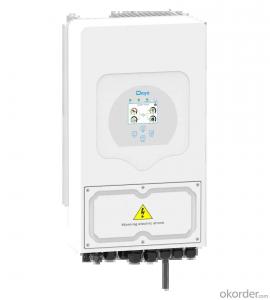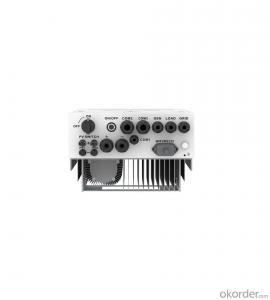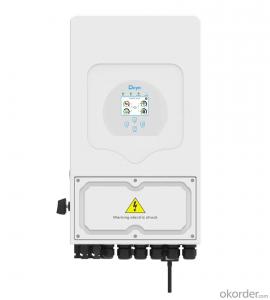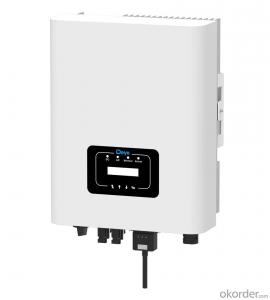2000 Watt Solar Inverter Sun600/800/1000G3-EU-230 600-1000W Single Phase 2 MPPT Micro-Inverter Rapid Shutdown
- Loading Port:
- Ningbo
- Payment Terms:
- TT OR LC
- Min Order Qty:
- 100 pc
- Supply Capability:
- 5000 pc/month
OKorder Service Pledge
OKorder Financial Service
You Might Also Like
Specification
The SUN 600/800/1000G3 is a new generation grid-tied microinverter with intelligent networking and monitoring systems to ensure maximum efficiency. The SUN 600/800/1000G3 is optimized to accommodate today’s high output PV modules effectively with up to 500W output and dual MPPT. Also, it supports rapid shutdown application, ensuing your investment safe.
Module level monitoring, safer and smarter
Max. DC input current 12.5A, adapt to 500W PV module
Rapid shutdown function
IP67 protection degree,10 years warranty
PLC, Zigbee or WIFI communication
2 MPP trackers, module level monitoring
| Technical Data | ||||||||
| Model | SUN600G3-US-220 | SUN800G3-US-220 | SUN1000G3-US-220 | |||||
| Input Data (DC) | ||||||||
| Recommended input Power (STC) | 210~400W (2 Pieces) | 210~600W (2 Pieces) | 210~600W (2 Pieces) | |||||
| Maximum input DC Voltage | 60V | |||||||
| MPPT Voltage Range | 25~55V | |||||||
| Full Load DC Voltage Range (V) | 24.5~55V | 33~55V | 40~55V | |||||
| Max. DC Short Circuit Current | 2×19.5A | |||||||
| Max. input Current | 2×13A | |||||||
| No.of MPP Trackers | 2 | |||||||
| No.of Strings per MPP Tracker | 1 | |||||||
| Output Data (AC) | ||||||||
| Rated output Power | 600W | 800W | 1000W | |||||
| Rated output Current | 2.7A | 2.6A | 3.6A | 3.5A | 4.5A | 4.4A | ||
| Nominal Voltage / Range (this may vary with grid standards) | 220V/ 0.85Un-1.1Un | 230V/ 0.85Un-1.1Un | 220V/ 0.85Un-1.1Un | 230V/ 0.85Un-1.1Un | 220V/ 0.85Un-1.1Un | 230V/ 0.85Un-1.1Un | ||
| Nominal Frequency / Range | 50 / 60Hz | |||||||
| Extended Frequency / Range | 45~55Hz / 55~65Hz | |||||||
| Power Factor | >0.99 | |||||||
| Maximum units per branch | 8 | 6 | 5 | |||||
| Efficiency | ||||||||
| CEC Weighted Efficiency | 95% | |||||||
| Peak Inverter Efficiency | 96.5% | |||||||
| Static MPPT Efficiency | 99% | |||||||
| Night Time Power Consumption | 50mW | |||||||
| Mechanical Data | ||||||||
| Ambient Temperature Range | -40~65℃ | |||||||
| Size (mm) | 212W×230H×40D (Without mounting bracket and cable) | |||||||
| Weight (kg) | 3.15 | |||||||
| Cooling | Natural cooling | |||||||
| Enclosure Environmental Rating | IP67 | |||||||
| Features | ||||||||
| Compatibility | Compatible with 60~72 cell PV modules | |||||||
| Communication | Power line / WIFI / Zigbee | |||||||
| Grid Connection Standard | EN50549-1, VDE0126-1-1, VDE 4105, ABNT NBR 16149, ABNT NBR 16150, ABNT NBR 62116, RD1699, UNE 206006 IN, UNE 206007-1 IN, IEEE1547 | |||||||
| Safety EMC / Standard | UL 1741, IEC62109-1/-2, IEC61000-6-1, IEC61000-6-3, | |||||||
| Warranty | 10 years | |||||||
- Q: Can a solar inverter be used in a net metering system?
- Yes, a solar inverter can be used in a net metering system. In fact, a solar inverter is an essential component of a net metering system as it converts the direct current (DC) electricity generated by solar panels into alternating current (AC) electricity that can be used in homes and businesses. The excess electricity generated by the solar panels is fed back into the grid through the inverter, allowing for net metering and potentially earning credits or reducing electricity bills.
- Q: What is the maximum DC input current of a solar inverter?
- The maximum DC input current of a solar inverter can vary depending on the specific model and its design. However, in general, the maximum DC input current of a solar inverter is determined by its capacity and is usually specified by the manufacturer.
- Q: How does a solar inverter handle voltage harmonics?
- A solar inverter handles voltage harmonics by using filtering techniques and advanced control algorithms. These methods help to smooth out the output voltage waveform, reducing or eliminating any unwanted harmonics.
- Q: Can a solar inverter be used with a solar-powered CCTV system?
- Yes, a solar inverter can be used with a solar-powered CCTV system. A solar inverter is responsible for converting the direct current (DC) produced by solar panels into alternating current (AC) that can be used to power electrical devices. In the case of a solar-powered CCTV system, the solar inverter can convert the DC power generated by the solar panels into the AC power required to run the CCTV system, ensuring it functions properly.
- Q: What is the role of frequency support in a solar inverter?
- The role of frequency support in a solar inverter is to ensure that the electricity generated by the solar panels is synchronized with the frequency of the electrical grid. This support is necessary to maintain grid stability and prevent any disruptions caused by fluctuations in frequency. The solar inverter monitors the grid frequency and adjusts the output of the solar panels accordingly, either by increasing or decreasing the power generation, to match the grid's frequency requirements.
- Q: How does a microinverter differ from a string inverter?
- A microinverter differs from a string inverter in that it is a small, individual inverter that is connected to each solar panel in a system, whereas a string inverter is a larger inverter that is connected to multiple panels in a series (string). This means that each panel with a microinverter can operate independently, optimizing the power output of each panel, while a string inverter operates based on the performance of the entire string of panels. Microinverters also allow for easier monitoring and maintenance as the performance of each panel can be individually tracked, whereas with a string inverter, any issues affecting one panel can impact the output of the entire string.
- Q: Can a solar inverter be used with solar-powered remote sensing systems?
- Yes, a solar inverter can be used with solar-powered remote sensing systems. A solar inverter is responsible for converting the direct current (DC) produced by solar panels into alternating current (AC) that can be used to power electrical devices. In the case of solar-powered remote sensing systems, the solar inverter plays a crucial role in converting the DC power generated by the solar panels into AC power to operate the sensing equipment. This ensures the efficient utilization of solar energy in powering remote sensing systems.
- Q: Can a solar inverter be used with a solar-powered pool heating system?
- Yes, a solar inverter can be used with a solar-powered pool heating system. The solar inverter is responsible for converting the direct current (DC) electricity generated by the solar panels into alternating current (AC) electricity that can be used to power the pool heating system. By connecting the solar inverter to the solar panels and the pool heating system, the solar energy can be efficiently harnessed and utilized to heat the pool.
- Q: How does a hybrid solar inverter work?
- A hybrid solar inverter works by converting the direct current (DC) electricity generated by solar panels into alternating current (AC) electricity that can be used to power appliances and equipment in a home or business. It also has the ability to store excess electricity in batteries for later use. Additionally, it can draw electricity from the grid when solar power is not sufficient, ensuring a continuous power supply. Overall, a hybrid solar inverter maximizes the use of solar energy and provides flexibility in managing electricity consumption.
- Q: How does a solar inverter handle voltage regulation during high demand?
- A solar inverter handles voltage regulation during high demand by adjusting the power output from the solar panels to match the required load. It constantly monitors the voltage and current levels and adjusts its operation accordingly to ensure a stable and regulated output voltage. This is achieved through various control mechanisms, such as maximum power point tracking and voltage regulation algorithms, allowing the inverter to efficiently manage and distribute power during periods of high demand.
Send your message to us
2000 Watt Solar Inverter Sun600/800/1000G3-EU-230 600-1000W Single Phase 2 MPPT Micro-Inverter Rapid Shutdown
- Loading Port:
- Ningbo
- Payment Terms:
- TT OR LC
- Min Order Qty:
- 100 pc
- Supply Capability:
- 5000 pc/month
OKorder Service Pledge
OKorder Financial Service
Similar products
Hot products
Hot Searches
Related keywords
